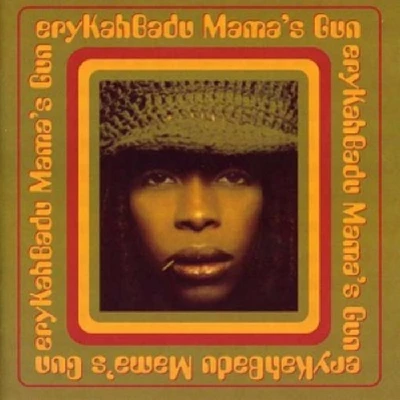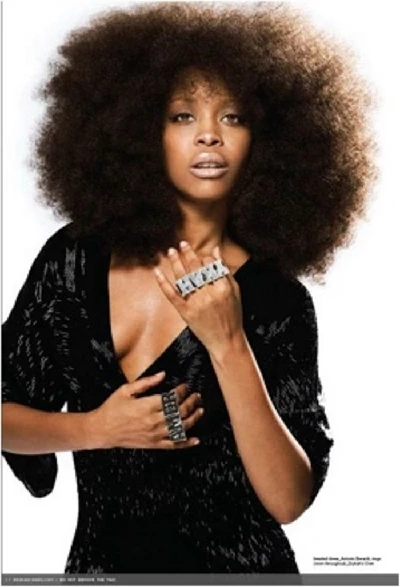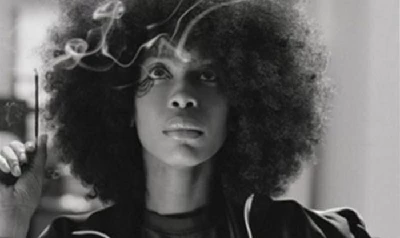published: 18 /
5 /
2011

Sarah Mwangi reflects on New York-based singer-songwriter and soul musician Erykah Badu’s 2000 second album, ‘Mama’s Gun’
Article
I recently lost my iPod. A tragic event for any melomaniac and it affected me deeply. See, ever since I was 17, I’ve always had 30GBs in my pocket. Sure, at the beginning it contained music I can only excuse as youthful indiscretion, but over the seven years I had it it had become a finely pruned machine. It was the most personal item I owned.
Two months on, I’ve gotten over the initial shock but I can’t deny that its absence didn’t leave me lost, gazing idly at the adverts above people’s heads on the tube and walking alone in a city of seven million. The unfamiliar silence was unsettling and it wasn’t long until I sought a replacement. And so the task of rebuilding my music library began as I dusted off forgotten CDs, selecting those worthy to be revived once more in MP3 form.
The usual suspects made it through my intensified scrutiny unscathed while others fell, without a chance. Tom Waits, My Morning Jacket, Chet Baker all made it through. But no prayer could have saved John Mayer or Blink 182. Those were the easy ones though; the polar opposites who shouldn’t be in a confined place together. The harder to settle on had to be heard again.
And as she sang her case, I found myself declaring my undying love for her, promising never to falter again.
I’m not sure when I first fell in love with Erykah Badu. I can’t remember when I first got to hear her or what the introductory song was, quite possibly, the Roots ‘You Got Me’ in which she features or ‘Love of My Life’ with Common or her own ‘On and On’ the leading single from her debut ‘Badiuzm’. Added to that is my inability to tell you how I found out about her in the first place, whether be it from a friend’s mixtape, my own musical searchings or my sister’s boyfriend’s iPod. All I know is that those fleeting moments with her led me to the aforementioned scene, on my bedroom floor, her voice coursing through my veins.
I acquired ‘Mama’s Gun’ years after its release and so I didn’t get the immediate context of the hows and whys it was created and I also bypassed the reviews. The lack of both, I find, increased my genuine love for it. I didn’t have anyone else’s subjectivity influencing how I interpreted her lyrics or themes. And truly, apart from 'A.D. 2000', (which is written as a requiem to Amadou Diallo, shot 41 times by New York City Policemen), context isn’t at all necessary.
In addition to this, I listened to individual songs at different times over the years and got the full album much later. Both helped and hindered my appreciation of the whole. I don’t think this album has one overall theme, and so listening to the tracks individually emphasises their intricate designs and doesn’t break up the momentum. Listening to them as intended, however, helps to highlight its core, which I lost first time around. There is an ever present bass on it. At once rich and earthy, it’s the life-blood of every song. It gives ‘Orange Moon’ its vivid imagery, ‘Penitentiary Philosophy’ its brazen assurance and simplified it gives ‘A.D. 2000’ an exposed rawness.
‘Orange Moon’ is among the first standout songs that hold you once you’ve played it through. With crickets in the background, Badu paints the picture of "I’m an orange moon, reflecting the light of the sun." The low-tempo fills in the details as it illustrates the stillness of the night, and Badu’s lullaby delivery mimics the slow flirtations between the characters who impress so much on each other and are better for it.
And if ‘Orange Moon’ is about how Badu felt at the height of a relationship, ‘Green Eyes’ is about it at its collapse. It is ten minutes long, and divided into three acts that pass through arrangements fitted for a forgotten, scratchy blues vinyl to smooth jazz. Badu recounts her emotions as she was faced with the breakdown of a heartbreaking relationship, and more specifically, the collapse of her relationship with André Benjamin, (Outkast’s André 3000) with whom she has a son.
At once witty and heartbreaking, addressing her ex-lover, she starts with denial: "My eyes are green/Cause I eat a lot of vegetables/It don't have nothing to do with your new friend." And like a conversation born out of frustration and desperation, the truth slowly comes out in the second act. She states that she knows she should get over him but her "heart lags behind." Badu builds on the level of honesty she’s revealing as each act passes. She wants to stay cool and in control but by the final act, she bares all as she admits defeat. "Just make love to me/Just one more time and then you’ll see/I can’t believe I made a desperate plea/What’s with me?" She’s confused, as much as she wants him back, she also regrets falling so deeply and accuses him of tricking her, making her believe that she saw herself in him and him in her, just like the prologue of their love, ‘Orange Moon’. The whole track is excruciatingly sincere.
It’s an album full of fragile confessions, as she continues the trend with ‘Didn’t Cha Know’. Singing helplessly "think I made a wrong turn back there somewhere," Badu lets her fragile charm carry her introspective lyrics. In fact, this is a trait Badu manipulates quite expertly throughout ‘Mama’s Gun’. As she juxtaposes the vision of a strong woman, bold and cock-sure one minute (‘Penitentiary Philosophy’,‘Booty’) but as the seconds tick away, she takes down her armour and she presents us with her imperfections (‘Cleva’ and ‘Didn’t Cha Know’) and then back again.
There’s just so much to love here. Erykah Badu creates exactly the type of songs that someone like her should make. By which I mean, the type of songs a genre-bending poetic songstress should have in her repertoire. Her earthy vocals effortlessly melds jazz, soul, funk and rock structures, strengthening them with empowering, embittered and often witty lyrics with sensitive, urban and bluesy delivery.
And her idiosyncrasies are what I come back for. The simple ‘ohhhhh heeeeey’ chorus of ‘Didn’t Cha Know’, the way she sings the second words of the rhyming couplets in ‘My Life’ and the “sittadownbaamba” scat as she imitates the horns and drums of ‘Booty’. And although not my favourite track, I would happily listen to ‘In Love with You’ with Steve Marley in its entirety, just to hear her laugh as they exchange love proclamations (exactly 4 minutes 27 seconds in).
There are two parts why Badu’s second studio album and third overall has held its ground in the decade since it was released. Firstly, Badu’s honesty and willingness to show her vulnerability next to her confidence laid the songs in a solid foundation of authenticity which ring true. Secondly, she surrounded herself with inimitable figures of the genres featured to help her develop the subtleties needed. Soul and funk veteran Roy Ayers, jazz trumpeter Roy Hargrove, and the all encompassing bassist Pino Palladino. J. Dilla, ?uestlove, and D’Angelo members of her then (hip-hop/soul) side-project Soulquarians family also featured as well.
With an arsenal so full and varied, Erykah Badu could do nothing but overcome the sophomore slump with ease.
It is albums like this that I want to be the pillars of my music library. The unyielding columns that weather through your wavering interest, slowly becoming shelving structures to place your new curiosities on. But when a quake rattles the shelves, only the bare columns will remain reminding you of their enduring qualities and which will help you rebuild once more.
Track Listing:-
Picture Gallery:-

